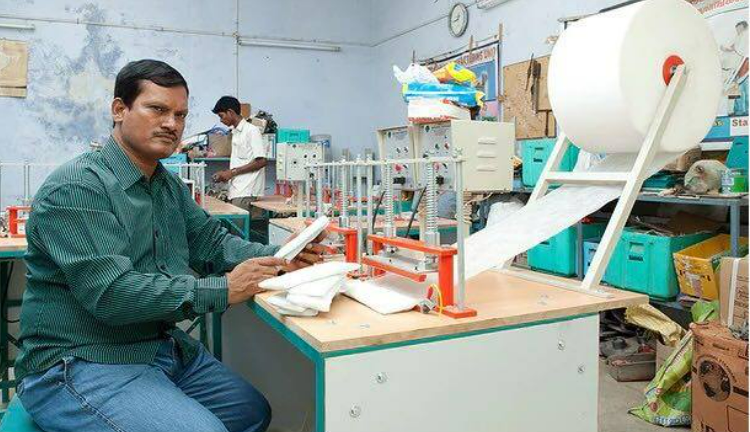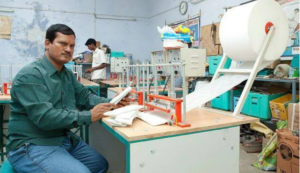Arunachalam Muruganantham was born in a small village in Tamil Nadu, India in 1962. He grew up in a poor family and did not have the opportunity to receive a formal education. However, he taught himself to read and write, and eventually went on to start his own business.
In 1998, while he was working as a welder, he noticed that his wife was using dirty rags during her menstrual cycle. This led him to investigate the cost and availability of sanitary pads in rural India. He found that commercial sanitary pads were too expensive for most rural women to afford and decided to invent a low-cost machine that could produce sanitary pads at a fraction of the cost.
It took Muruganantham several years to perfect his machine and during this time, he faced a lot of resistance and skepticism from the people around him. Many people thought he was crazy for trying to invent a machine for making sanitary pads, and he faced a lot of criticism and discrimination.
Despite these challenges, Muruganantham persevered, and in 2006, he finally succeeded in inventing a low-cost sanitary pad-making machine. He then trained many rural women to operate the machine and set up their own small businesses to produce and sell sanitary pads.
His work has had a significant impact on the lives of many women in rural India, by providing them with access to affordable sanitary pads, and helping to improve their health and dignity. His story has been widely covered in the media and has been made into a Bollywood movie Pad Man in 2018.
He continues to work on improving the machine, and making it more accessible for women and girls in rural areas, his work is still ongoing, and he continues to be an advocate for menstrual hygiene and women’s health.
His invention made it possible for women in rural areas to afford sanitary pads, which in turn helped to improve their health and dignity. He also trained many rural women to operate the machine and set up their own small businesses to produce and sell sanitary pads.
Muruganantham’s work has been recognized by several organizations and government bodies, including the Indian government, which awarded him the Padma Shri, one of India’s highest civilian honors, in 2016. He was also included in Time magazine’s list of 100 most influential people in the world in 2014.
Despite the recognition, Muruganantham’s work is not well known outside of India. His story is an inspiration for his commitment to women’s health and his ability to make a real impact in the lives of many women in rural India.
Arunachalam Muruganantham is an Indian social entrepreneur who is best known for inventing a low-cost sanitary pad-making machine and for his work in promoting menstrual hygiene in rural India. He is often referred to as the “menstrual man” of India.
Muruganantham’s journey began when he noticed that his wife was using dirty rags during her menstrual cycle. He wanted to help her but found that commercial sanitary pads were too expensive for her to afford. This led him to invent a low-cost machine that could produce sanitary pads at a fraction of the cost of commercial pads.
His invention made it possible for women in rural areas to afford sanitary pads, which in turn helped to improve their health and dignity. He also trained many rural women to operate the machine and set up their own small businesses to produce and sell sanitary pads.
Muruganantham’s work has been recognized by several organizations and government bodies, including the Indian government, which awarded him the Padma Shri, one of India’s highest civilian honors, in 2016. He was also included in Time magazine’s list of 100 most influential people in the world in 2014.
Despite the recognition, Muruganantham’s work is not well known outside of India. His story is an inspiration for his commitment to women’s health and his ability to make a real impact in the lives of many women in rural India.
Here are a few additional things I know about Arunachalam Muruganantham:
He has been honored by many organizations and government bodies for his work, including the Indian government, which awarded him the Padma Shri, one of India’s highest civilian honors, in 2016.
He has been recognized by several international organizations for his work, including the United Nations, which named him one of the six heroes of the sustainable development goals in 2017.
He has been invited to speak at several international conferences and events, such as the Clinton Global Initiative in 2013, where he shared his story and the impact of his work.
His story has been covered by several major media outlets, including the BBC and CNN, and has been featured in documentaries and films.
He has been invited to speak at several universities and business schools around the world, such as the Harvard Business School, where he shared his story and the impact of his work.
He is an Ashoka Fellow, an award given to social entrepreneurs who have demonstrated exceptional creativity, dedication, and impact in their work.
He is the founder of Jayashree Industries, a social enterprise that manufactures and supplies low-cost sanitary napkin-making machines to rural women across India.
He is known for his strong emphasis on sustainability and environmental conservation in the production and disposal of sanitary napkins.
He has been actively working on improving the machine, and making it more accessible for women and girls in rural areas.

